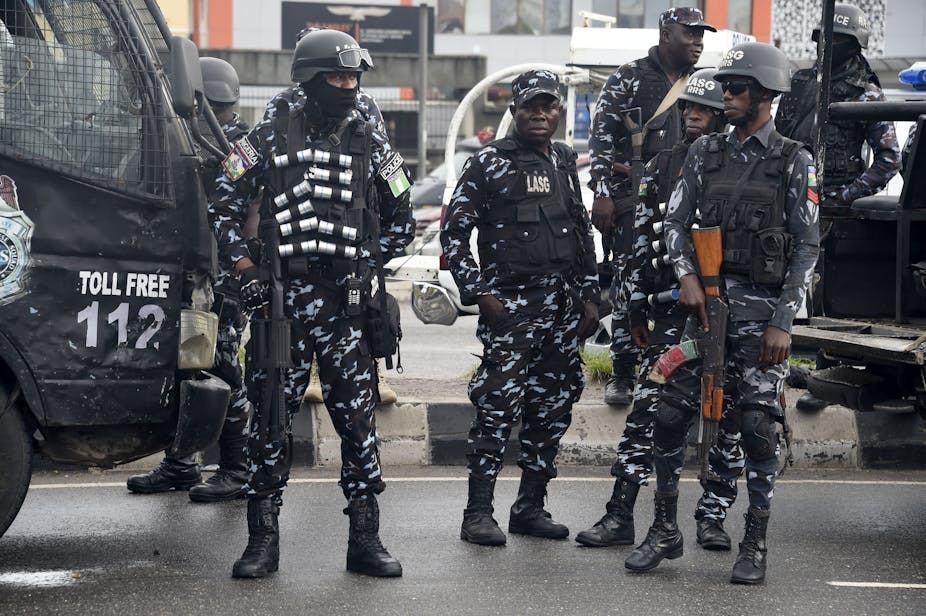Security in Nigeria has degenerated in the last 10 years. Various non-state armed groups have emerged countrywide.
These actors include criminal gangs, separatist groups, Islamic fundamentalists and kidnappers. They all have different motivations and ways of operating.
One of the country’s most pressing security challenges is described as “banditry”. It includes armed robbery, kidnapping, murder, rape and illegal possession of firearms.
Attacks by bandits increased from 124 to 1,031 incidents between 2018 and 2022. There were around 13,485 banditry-related deaths between 2010 and May 2023.
The activities of bandits are fast spreading from north-western Nigeria to states in the north-central region. This is aided in part by the limited state presence in the rural areas of these regions.
The primary authority to amplify state presence is the police. But poor policing in these areas has enabled banditry to continue. A different policing approach is needed.
In a recent paper I propose a new approach to policing the problem. I set out a framework which encompasses mainstream policing, hybrid policing and a new layer of security architecture – a joint task force with the state police.
The proposed model places the local community at the centre of policing, rooting policing in society.
Federal and state police
At the moment, policing in Nigeria is under the central control of the federal government. Section 214 of the 1999 Nigerian constitution says that aside from the Nigeria Police Force, “no other Police Force shall be established for the Federation or any part thereof”.
I argue that multilevel policing would be well suited to combating armed banditry and other criminality in the country.
The proposed framework reconstructs the police system to cut across the federal and sub-national governments.
The federating units ought to take greater charge of security within their own jurisdiction. The federal government should also maintain a critical lever of management, and support the devolution of police power to the states.
The state level would complement, not replace, the federal police.
Research aims and methods
To arrive at this suggested framework, I reviewed literature and interviewed key informants from religious communities, women’s groups, youths, academia and police. I focused on four states – Kaduna, Katsina, Niger and Zamfara – that have emerged as banditry hotspots in Nigeria.
The study also drew on information on terror attacks extracted from the Armed Conflict Location and Event Data (ACLED) project.
This project provides data about the date, location and perpetrators of bandit attacks. Coordinates show their spatial distribution and pattern.
Through qualitative and quantitative research, my study attempts to come up with a policing model that can counter armed banditry in north-west Nigeria.
Responses to banditry
There are four distinct but complementary models in the existing – though disjointed – security mix and law enforcement responses to banditry. They are the mainstream policing, vigilante, hybrid policing and joint task force models.
Nigerian Police Force: The job of the Nigerian Police Force is mainstream policing: gathering intelligence, identifying and protecting vulnerable targets, and responding to attacks.
The police force has foiled banditry attacks, neutralised bandits, recovered AK-47 rifles and motorcycles used in attacks, arrested suspects and rescued victims.
Vigilante model: Communities adopt this approach to compensate for a lack of police presence. Vigilante organisations are sustained associations of private citizens voluntarily seeking to provide quasi security functions. Their methods of preventing crime may involve force or the threat of force. They may rescue victims, arrest criminals, and participate in joint security operations with the police and army.
Vigilante groups in the north-west hold training sessions but have only crude weapons. This puts them at a disadvantage against bandits.
Hybrid policing model: This is about community-focused engagement. Zamfara state hired 7,500 youths. The trainees were deployed locally to help the conventional security agents. Katsina state has also used community policing for simple routine duties such as crowd control, traffic and patrol duties, and gathering intelligence.
Joint task force model: This is the idea of inter-agency collaboration to achieve fast results through the combination of military and policing capabilities. It is a crisis response strategy.
Countries where military and law enforcement agencies have been fused for peace operations include Bosnia-Herzegovina and Kosovo. The experiment has yielded useful results in operations against organised and serious war crimes.
Policing to combat armed banditry
My study proposes a police system that cuts across levels of government.
Constitutionally, Nigeria operates a unitary policing system. The Nigeria Police Force is the sole policing actor with a constitutional mandate.
However, other policing actors (such as the vigilante and hybrid policing models) operate in the space with different levels of legitimacy, highlighting the chaotic policing framework in Nigeria.
Therefore, my core argument is that the Nigerian government must consider decentralising policing from the federal to state and community levels. This is the idea of multilevel policing and it requires constitutional amendment.
This will create a scenario where the present vigilante structure can be constituted as a local community level policing organ for the purpose of intelligence gathering and other community level policing activities.

